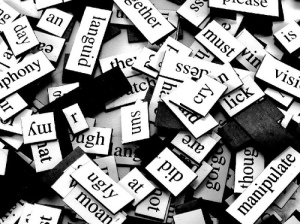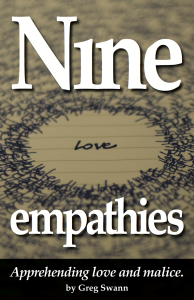I’m writing a short book of philosophy this weekend discriminating among depths of empathy. This is how it begins:
Introduction: Empathy unbound.

Of the nine kinds of empathy I want to explore, only three concern real people, the next three essentially fictional people, with the last three illuminating ideas of empathy for things that are not even alive – or not even real things! Imagination about the completely imaginary? Who ever heard of such a thing?A poet, of course, and I approach this as a poet, so just as we move from the most real of empathies to the most fanciful, so do we move from those empathies that are nearest to one’s own experience to those most remote – and from the most to the least actionable. I can do a lot of immediate benefit for my niece. My contributions to the ideas self-adoration and human sovereignty – and now empathy – may take a little longer to come to fruition. These are all expressions of empathy for the idea, the most fanciful, most remote and least actionable of empathies, but the one that can make the greatest and most enduring of differences in real human lives in the long run.Photo by: Steve Johnson
Here is everything empathy is not: Self-sacrifice.
How do I know that? Because no purposive human behavior is self-sacrificial. To act is to express a preference – to seek to instantiate a subjunctively postulated future world that has been improved by that expression – and the primary beneficiary of that future state is the actor. He may in fact be seeking a benefit – or a loss – to be experienced by another party, but that is a conditional and incidental secondary consequence. Every action is taken first by the self upon the self as the expression of the self.
There are no exceptions to this, including the allegedly self-sacrificial suicide. To act is to prefer, and to prefer is necessarily an expression of the actor’s own self – his lifelong, iteratively revised and adapted idea of who he is and what he does and does not do. The self is the essential idea of the uniquely human life, and everything any one of us does is first and most significantly the expression of this idea.
“But, but, but…! My uncle got out of a nice warm bed to help me change my tire in the freezing rain! How can you say that’s not self-sacrifice?”
Because it’s not. Your uncle did what he did because he liked your safety better than his own comfort in that circumstance – because you were important to him. For everyone else on earth, he would have chosen to stay in bed. But for you, he chose to make his own world a little better by making your world a lot better. His choice. His benefit. His self. No sacrifice.
There is no contrary to this. Every empathetic thought and empathy-instigated deed is an expression of the actor’s own self – and nothing else – in just this way. There is no such thing as self-sacrifice, ever. If the action is self-motivated, then as a matter of ontological necessity the actor is the thing that is being acted upon first and most fundamentally. Even if the action ends with the actor’s death, the act itself could not have been a sacrifice in his own estimation: He chose to make his corporeal life end to defend something he valued even more highly – typically his spouse or his family.
Once we understand empathy that way – as the actor seeking his own values by means of his understanding of other people’s lives and motivations – the scales fall from our eyes. We can explore empathy in a much deeper way – the way that human beings actually live it, rather than the stunted, crippled and devilishly irreproducible academic ideal of a shamed and guilty shmoo being endlessly victimized by schnorrers. Those kinds of events may happen, but the empathy runs all the other way, as we’ll see.
Empathy ultimately is imagination – the invocation of the presumed mental states to be found in other people’s minds, but also the contra-factual insistence that one can experience at first hand the interior existence of another entity – and there cannot be an act of imagination that is originated by and for the benefit of anyone other than the actor himself.
You’ll note that I used the word “entity” in that definition. Of the nine kinds of empathy I want to explore, only three concern real people, the next three essentially fictional people, with the last three illuminating ideas of empathy for things that are not even alive – or not even real things!

The Grand Unifying Theory of Human Motivation – as taught to me by a turtle, and by an eternally-outraged human reptile.To read more about empathy, see me, feel me, touch me, heal me at Amazon.com.
A poet, of course, and I approach this as a poet, so just as we move from the most real of empathies to the most fanciful, so do we move from those empathies that are nearest to one’s own experience to those most remote – and from the most to the least actionable. I can do a lot of immediate benefit for my niece. My contributions to the ideas of self-adoration, human sovereignty, the family – and now empathy – may take a little longer to come to fruition. These are all expressions of empathy for the idea, the most fanciful, most remote and least actionable of empathies, but the one that can make the greatest and most enduring of differences in real human lives in the long run. Changing lives? That’s the leadership of the poet.
Virtually all of philosophy, not just reductionist science, labors under the delusion – an empathy for the impossible – that people can be controlled from the outside, and can thus be impelled to betray their own interests and values. My impression is that the sole interest academia takes in empathy is to try to figure our how to build a better shmoo.
I work the other way. I know the self is the cardinal value of the uniquely-human life – the life of the abstract, conceptual, freely willing mind that matures at about age five, the actual birth of humanity in the life of a genetic Homo sapiens – and that therefore self-adoration is the cardinal virtue of the fully-human life.
How do you adore your self while your loved ones suffer? How can you be so much in love with them that you cannot distinguish loving from being loved? How can you plan to share a lifetime – to build a home, a family, a future – with someone you really only know by conjecture? This is why you need empathy – and why its real-life expressions are never a self-sacrifice.















